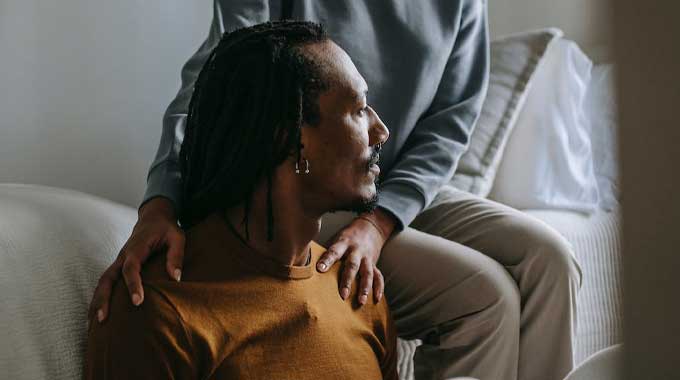Alcohol addictions affect more than just the individual suffering; they can strain any relationship – especially with family members and other loved ones. Alcohol can begin to dominate a person’s life, causing them to neglect or mistreat those around them.
If your partner is struggling with alcohol addiction, you may be feeling frustrated, worried, and even exhausted. However, there is support available for you and your partner. This blog explores some helpful steps you can take to look after yourself and your loved one.
Understanding Alcohol Addiction
One of the most helpful things you can do is learn more about alcohol addiction and alcohol abuse. Educating yourself on substance addiction can help you understand your partner’s feelings and actions better.
To help you understand alcohol abuse and alcohol addiction, we have shared a wealth of information below.
What Is Addiction?
Drug addiction is when a person compulsively seeks or uses a drug or alcohol, even if they understand that doing so comes hand-in-hand with negative consequences.
Alcohol addiction involves strong urges to drink alcohol that can be difficult to resist. Contrary to belief, addiction is a brain disease that usually requires more than just willpower to overcome.
How Does Alcohol Affect the Brain?
When a person repeatedly drinks too much alcohol, it affects the reward pathway of their brain. The reward pathway is a natural part of how the brain works; it encourages us to repeat life-preserving functions like eating and sex.
Related article: Alcohol and sleep
When we perform these activities, the brain releases a small amount of the chemical dopamine. Dopamine causes us to perceive the action as pleasurable and makes us want to do it again.
When we drink alcohol, our brain becomes overloaded with dopamine. Over time, this causes physical changes to the reward system, leading to much stronger urges to repeat the activity. These brain changes can be long-lasting or even permanent and may persist even after long periods of abstinence.
How Can You Treat Alcohol Addiction?
The good news is that drug and alcohol addiction is treatable. Decades of scientific research have uncovered effective addiction treatment methods that help people overcome addictive behavior and reverse changes in the brain. No matter how severe the problem, almost anyone can benefit from some kind of treatment.
How To Deal With Alcoholism in Relationships?
Dealing with alcoholism in relationships can be challenging. However, if your partner’s drinking habits have escalated, there are many things you can do to help them and yourself.
Set Boundaries
When you love someone, it is normal to want to fulfill their needs. However, if your partner struggles with alcohol and drug addiction, you may be unwittingly enabling their substance abuse.
You can enable your partner in many ways. Enabling may involve buying alcohol, providing financial support, or making excuses to cover unacceptable behaviors.
It is essential to set boundaries to avoid enabling unhealthy drinking habits and prevent a codependent relationship. Setting boundaries can also help you protect your own needs and stop you from giving too much energy to your partner. Remember, setting boundaries and avoiding enabling your partner is the best solution for both of you in the long term.
Encourage Treatment
Most people living with alcohol addiction need some kind of support to maintain long-term sobriety. In addition, anyone with alcohol dependence should seek professional medical advice and support before they stop drinking because of potentially life-threatening withdrawal symptoms.
Get help: Drug Rehab Santa Ana
There are many kinds of substance abuse treatments available. Treatment may involve inpatient programs with residential stays in treatment facilities, outpatient treatment, or support groups like Alcoholics Anonymous (AA).
Clinical trials and extensive research show that addiction treatment works. With the right support, people can overcome addiction and lead healthy and fulfilling lives.
While you cannot force your partner to attend treatment, there are a few things you can do to facilitate the process, such as:
- Sharing your thoughts and feelings with your partner
- Talking about what treatment options are available
- Organizing a consultation with a treatment center and/or accompanying them there
- Staging an intervention with professional help if necessary
Look Out for Co-Occurring Disorders
Many people struggling with a substance use disorder also live with a co-occurring mental health disorder. Mental illness can be a driving factor behind drug abuse, acting as a coping mechanism for emotional distress. At the same time, alcohol affects our mental health and may exacerbate symptoms of depression and other mental health conditions.
If your partner’s alcohol consumption is high, look out for signs of other mental health conditions. Treating these conditions may help change the underlying causes of your partner’s addiction and lead to sustained recovery.
Many addiction treatment centers, such as our own, offer dual diagnosis programs that treat co-occurring disorders and addiction at the same time.
Look After Yourself
Being in a relationship with a substance user can be exhausting. For this reason, it is important to look after yourself too. Practicing self-care can help you maintain good mental health and well-being.
Self-care practices include:
- Eating balanced and healthy meals
- Getting enough sleep
- Yoga, meditation, and other relaxation techniques
- Exercising
- Seeing friends
- Doing activities you enjoy
- Creative outlets like music and art
Join a Support Group
You may also like to join a support group for family members of substance users such as Al-Anon. After all, you are not alone in your experience – over 14.5 million people had an alcohol use disorder in 2019, and many of these have partners and families. Support groups can help you learn from each other and find comfort and solidarity in shared experiences.
You can also explore professional therapy options to help you support your partner and take care of yourself. You may like to see a therapist on a one-to-one basis or participate in family therapy sessions with your partner. Many substance abuse treatment centers offer family therapy as part of their recovery programs.
Know Your Limits
While you may be able to tolerate some of your partner’s behaviors, it is important to know your limits. If you feel like you are in an unhealthy relationship where your needs are not being met, it may be time to end the relationship. In particular, there is never a reason to tolerate any kind of physical, verbal, or emotional abuse.
Women whose partners abuse alcohol typically experience more abusive behavior and mental health concerns. If you are experiencing domestic violence, you can contact the National Domestic Violence Hotline at 1.800.799.SAFE (7233).
Alcohol addiction affects every couple differently. For some, it is possible to have a healthy relationship with a partner living with alcoholism. Family therapy, self-care, and support groups may help you overcome difficulties and maintain good mental health. Remember, though, you are also important, and you may want to leave an unhealthy relationship.
If your partner is struggling with alcoholism or alcohol abuse, contact us today. At Cornerstone, we offer top-tier clinical care in inpatient and outpatient settings.
We are accredited by the Joint Commission, licensed and certified by the State of California Department of Health Care Services (DHCS), and recognized by the local Courts and Orange County Probation.
Our team of experts can offer confidential advice on how you can support your partner and outline what treatment options are available. We will listen to you and consider your unique needs to ensure we provide the most effective support for you. Call us anytime at (714) 547-5375.






